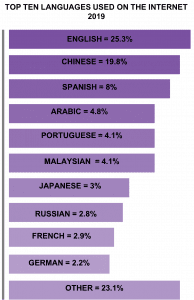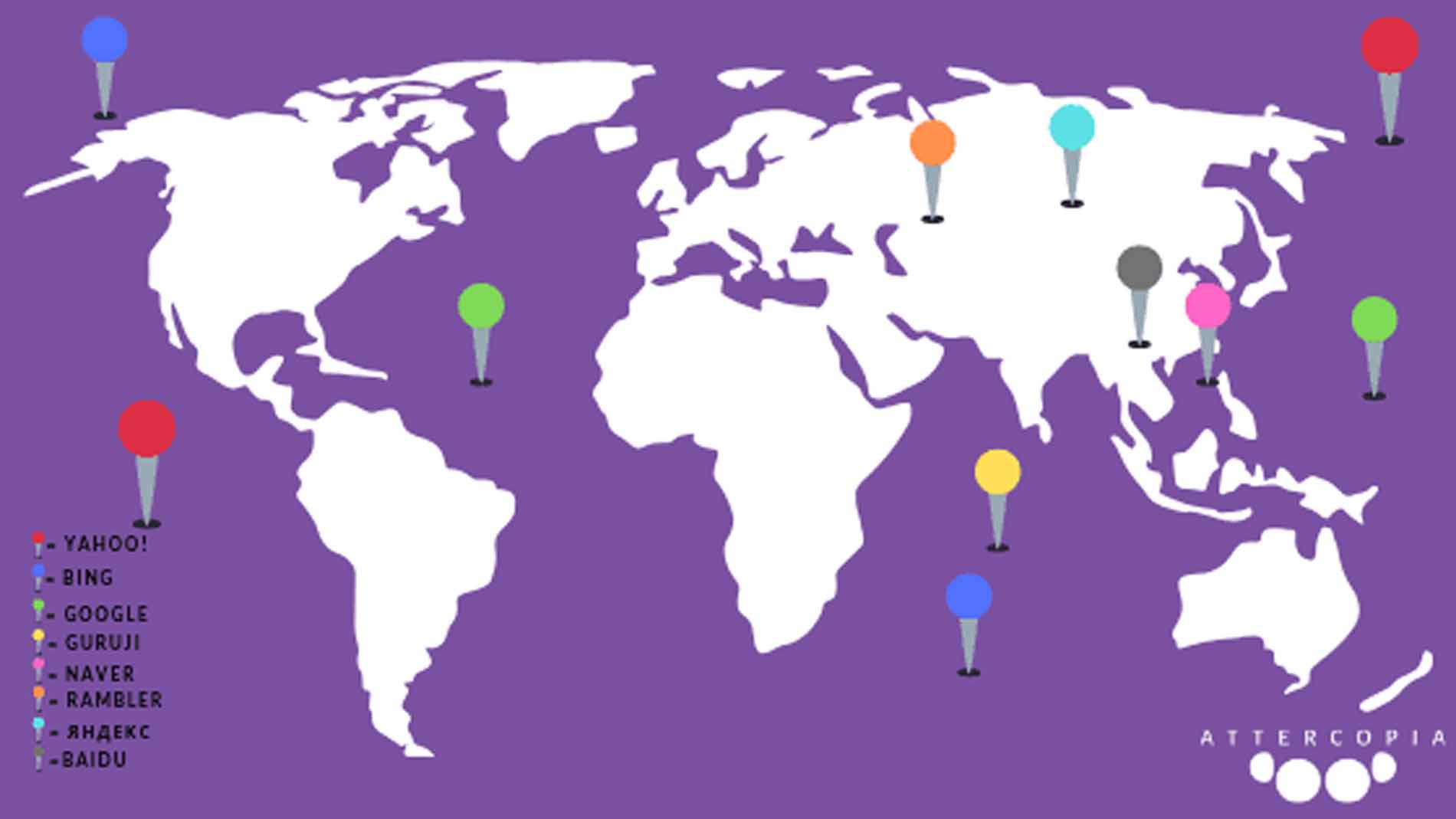International SEO optimises every element of your website so that search engines instantly know which countries, languages and customers you’re targeting from a global internet population of 3.3 billion.
In order to scale your business sustainably in areas like the US, Europe and Asia, you’ll need an adaptable, refined and sophisticated approach to SEO to reach and engage the relevant audiences, drive conversions and generate a great ROI.
With that in mind, here are five ways to improve your International SEO strategy and grow your business.
1. Perform an international technical SEO audit
The old adage ‘fail to plan, plan to fail’ applies as much to international SEO as any other strand of your digital marketing strategy.
That’s why a thorough International technical SEO audit is the first step towards increasing your visibility in rankings across different global search markets.
Firstly, although Google is the global giant in terms of search engines, it isn’t the only player when it comes to international markets – for instance, Baidu accounts for 77 percent of domestic search in China according to StatCounter, while Reuters reports that Yandex enjoys a 56 percent share of Russian search traffic.
And secondly, since each different search engine crawls and indexes sites according to unique algorithms, this means that the same SEO tactics might not automatically be effective universally.
After your audit, you’ll have everything you need to identify the appropriate target languages and conduct keyword research to define the high-intent topics, phrases and words that set search engines alight in each global market.
2. Use an international SEO-friendly URL structure and language tagging
You’ll need to ensure that your URL structure is appropriate if you’re aiming for a certain country with your website, and the following options are available:
- Country code Top Level Domain (ccTLD) – these URLs utilise a two letter code to let users and search engines know the territory in which the website’s based – you’ll probably be familiar with .uk and .us sites in this format.
- Subdirectories – these URLs place international content in a certain subfolder of the root domain. An example would be: design.com/UK.
- Subdomains – these put international content on a third-level domain that’s separate from the root domain. URLs in this format look like this: uk.design.com – and they might receive link juice from the root domain, but not always.
- gTLD with language parameters – these URLs adapt the URL parameter to target particular language speakers, such as: design.com/lang=en-uk.
- Different domain – this is when your international content is uploaded to a totally different root domain than your regular site. So the URL might look like: designcnsite.com
Each of these options has different pros and cons in terms of search signals, ranking factors and authority, but SEO pros can advise on the best choice for your circumstances and how to organise your site architecture and hierarchy so it’s easy for search engine spiders to crawl as well as optimised for user experience (UX).
After choosing the best URL structure, you can language-target each website page using hreflang tags – special pieces of code that clarify which language your content is available in.
With both of these technical issues taken care of, your website architecture and coding are conducive
to global SEO success.
3. Create and optimise content for International SEO

The most obvious and essential way to optimise your content for international SEO is to ensure that it’s in the correct language for the territorial market you want to enter.
But there are many more considerations to take note of than user language alone – and if you don’t address them, you won’t achieve the pinpoint optimisation necessary to maximise your reach and impact.
Therefore, don’t forget the following international SEO content tips:
- Many nations have several different language groups which you might want to engage with – for instance China has Mandarin, Cantonese, Mongolian and more.
- Although English is the most represented language online, many others are significant and the appropriate research will reveal the most relevant for your various websites.
- For optimal SEO, it’s also best not to rely on automated translation tools – professional human translation is far superior in terms of accuracy.
- A prerequisite for best international SEO practice is using native rather than fluent speakers. Only native language speakers have the deep understanding of every cultural nuance that’s necessary for your voice, tone and style to sound and feel completely authentic and genuine.
- Don’t forget that your design should be culturally appropriate too – elements like colours and typography can have a subtle yet significant influence over how website content is received in different countries and failure to take note of this can even cause offence in extreme circumstances.
Although the steps above will satisfy search spiders for engines like Google, Bing and others, remember that simultaneously developing content according to the principles of inbound marketing will likely win hearts and minds in most territories.
So the blogs, whitepapers, guides, infographics, videos and visuals you produce should entertain, engage, educate and inspire customers in order to create the long-term on- and offline relationships that drive sales and support sustained success.
4. Use blogger outreach to build links for international SEO
While regularly publishing your own blogs about evergreen and time-dependent topics has inherent SEO value, international blogger outreach boosts your rankings further by placing content on established and reputable high-traffic and high trust blogs.
These blogs are operated by influencers who already have established audiences who are receptive to your products and services – so as well as ramping up your rise in the rankings of the relevant search engine for each territory, your blogger outreach can drive traffic directly to your site.
If you want to supercharge your international SEO campaign, blogger outreach could be the secret ingredient you’ve been looking for. But before you embark on this specialist strand of technical SEO, be sure that:
- You or your partner agency have checked and verified the quality of the blogs or news sites your content will be placed on.
- That the blogs or articles you provide are written to the same high SEO and readability standards you would apply to those on your own site.
- That any written content you provide meets the editorial requirements of host sites.
- That you carefully monitor and measure the results from your blogger outreach.
- You assess different host sites against KPIs and be prepared to adjust your campaign so that it remains effective in the long-term.
If you’re an ambitious brand with aspirations to become the go-to guys in your niche in several territorial markets, international blogger outreach can be a worthwhile investment that sets you apart from the SEO competition.
So while you build up your web presence through optimising your website with onsite SEO techniques, this outstanding offsite SEO tactic should be ignored at your peril.
5. Use data tools and insights to monitor your international SEO campaign
Google isn’t the only search engine which regularly adjusts its algorithms to offer searchers the most relevant and useful results – the same applies in varying degrees to practically every search engine.
And across the globe, search trends are in a constant state of flux – so you’ll need to regularly tweak the topics, phrases and terms you use and refresh your content and UX in order to sustain SEO success.
But deploy data analytics tools like Google Analytics, Moz or any other rated and approved platform for a particular international market, and you’ll keep track of your international SEO campaign and be agile enough to make adjustments as the need arises.
A dip in SEO performance doesn’t equate to disaster – once you’ve made the necessary changes, resubmitting your site to be indexed again by the search engine of choice will often mean that your rankings and visibility recover quickly.
Furthermore, while no-one can predict the future of SEO with pinpoint precision, a switched-on agency with international experience will often pre-empt any negative effects of upcoming changes by taking preventative measures that protect your hard-earned rankings.
Your Key Takeaways on Growing with International SEO
If you’re serious about scaling your business in different territories and engaging customers from different cultures with your brand, international SEO is definitely worth investing in.
Here are a few key takeaways:
- Conduct an international technical SEO audit which will analyse and review your strengths and weaknesses and produce recommendations for ranking highly on the appropriate search engines for your target territories. This is your first step to an effective campaign.
- Use International SEO-friendly URL structures and language tagging to ensure that your website architecture and content is targeting the correct countries and language groups. Get these technical aspects optimised to make the most of your internationalised content.
- Create and optimise culturally-sensitive content for International SEO with relevant, engaging and respectful native-language elements that increase authenticity and improve customer trust. Remember that relying on auto-translation tools isn’t advised.
- Use blogger outreach for International SEO because building valuable links through high-trust and traffic sites can boost your SEO performance more quickly than relying on traditional SEO tactics alone.
- Use data tools and insights to monitor your International SEO Campaign because changes to algorithms and search trends will mean that you’ll need to make regular adjustments for it to remain effective.
Final thoughts about international SEO
Although English remains the predominant language used on the internet, remember that China has the most internet users (at 829 million), India ranks second at 560 million and the US is in third place with 293 million.
And provided your business offering meets local consumer demands, internet markets like Brazil, Indonesia and Japan are also massive.
So if you want to build a successful global brand for 2020 and beyond, you’ll need to expand your horizons – and International SEO can be your passport to success.
In an uncertain geopolitical climate, its combination of technical, creative and cultural skills aligns awesomely with brands who don’t want national borders to present any barriers to business.
Follow these five ways to grow with International SEO and you’ll be the name on every customer’s lips – from Amsterdam to Zhangzhou.
Ready to win with International SEO? Contact us today







